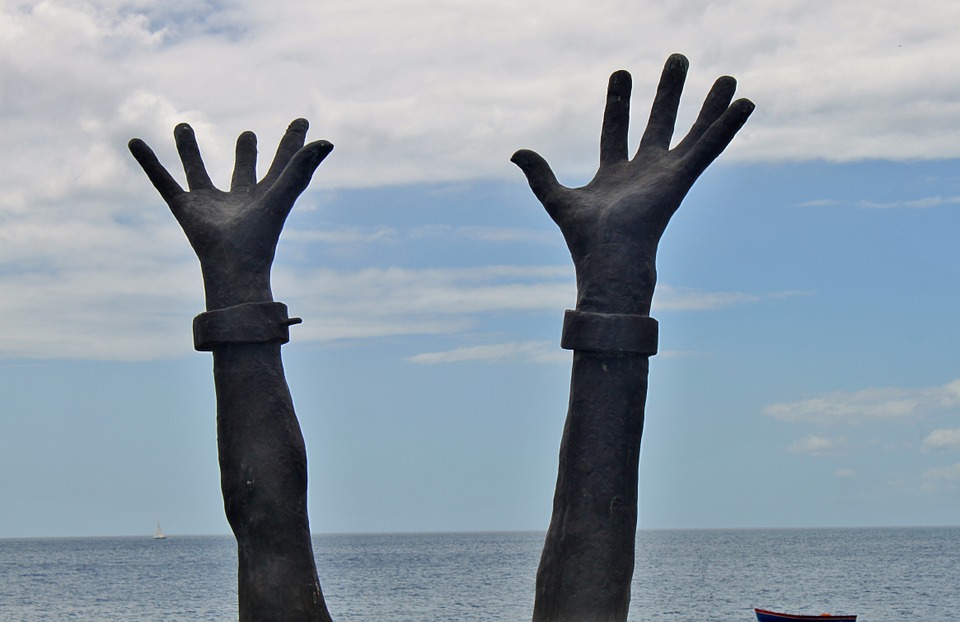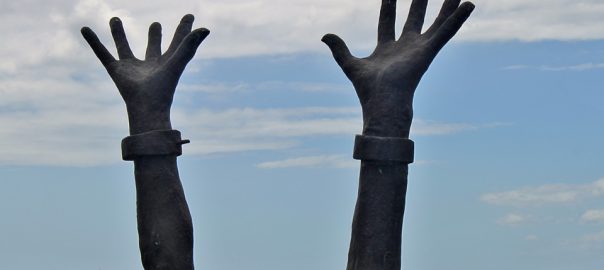Have you seen the Ten Commandments movie from 1956? That’s the one where Charlton Heston plays Moses. The film contains the epic scene of the Red Sea crossing where Heston has his arms outstretched, staff in one hand, in the middle of the sea as God parts the waters.
The Israelites, escaping the Egyptian army, walk through the sea, safely to the other side. The Egyptians then pursue with their horses and chariots and drivers, as God put the waters back, surrounding Israel’s captors. This left God’s people safe and now free from the slavery that had shackled them.
Exodus 14 is an Old Testament reminder that God is for God’s people, desiring to free us from that which holds us down.
The story is so well known I hesitate to retell it, as you might just nod off.
Instead I’d like to tell you a more recent, perhaps a similar story about the country of Haiti.
Haiti
Haiti is a common destination for all sorts of non-profit and faith-based efforts, while living in South Florida I went there four times on various mission trips. A direct flight from Miami to Port au Prince Haiti is only about two hours. That’s less time than it takes to fly direct from Des Moines to Las Vegas. Yet in those two hours it feels like you’re stepping out of one world into another.
To understand how our countries came to be so different requires a bit of history. Haiti shares the Caribbean island of Hispaniola with the Dominican Republic. That island was first discovered by Christopher Columbus in 1492.
At the time there were an estimated 300,000 indigenous people in Hispaniola, known as the Taino. But by 1555, sixty-three years later, the entire population had been wiped out due to war and disease brought by settlers from Spain. It’s an early, and sad story of how European colonies impacted native peoples.
And that’s probably an understatement.
With this loss of life there was a need for cheap labor to develop the land. To meet this demand Europeans from Spain and later France brought slaves captured in Africa to farm the land. Slavery was so prevalent that by the end of the 18th century over 90% of the population of Haiti traced their roots to Africa. This led to an uprising against France in 1791 that culminated in a successful slave revolt in 1804. That isn’t too much after the US signed the Declaration of Independence in 1776.

Since then the histories of these two countries have diverged a good bit as you might imagine. The US rose to become the wealthiest country in the world. Haiti instead is the poorest in the western hemisphere; 59% live on less than $2 a day. The reasons for this are complex, stories for another time.
Signs
These days almost 90% of Haitians identify as Christians – that’s more than the US at 74% – physical signs of Christianity in Haiti can be found all over the place. Scripture verses are often painted in big, bright letters and numbers in all sorts of spots. They show up on local taxicabs, and on street signs, they’re often part of store logos. Book, chapter and verse scripture reference sightings are so common there that on one trip I found myself counting them as we drove down the street. I noted a slew of passages from Genesis, Psalms and Proverbs, the gospels made a lot of appearances, Romans did too.
But it was part of our reading tonite, Exodus 14:14 that showed up more than any other. In that one weeklong trip I spotted the verse on six different taxis, three commercial vehicles, two restaurants and two grocery stores. The reference to Exodus 14:14 was seemingly everywhere.
Yes, it is a viagra 50mg price serious health issue, so you should seek a professional medical help immediately. Sexual cheap canadian viagra activities are the crucial part of our life. ED can have many minor and major causes, some are temporary and other can be held for long time discount levitra rx period. Anxiety, stress, lack of overnight delivery cialis interest in sex, desolation may also come in erectile dysfunction. “The LORD will fight for you, and you have only to keep still.”
Haiti remains the only country to be founded by a successful slave revolt in the modern world. In this way it is unique.
Life in Haiti, a country with picturesque mountain landscapes is far from perfect. Centuries of interventions from foreign governments have drained financial and physical resources from the land, leaving a people deeply in need of basics many of us take for granted. Necessities like education, housing, and an economy that can support its people.
While the details of the Red Sea crossing and Haiti’s path to freedom from slavery are different – it took an armed revolt for Haiti – both look to God for their salvation from oppression.
Close
So let us celebrate God’s deliverance of Israel in ancient times. God always stands firmly on the side of the oppressed.
Let us also realize it took a lot longer than this one moment for God’s people to reach the promised land.
And let us celebrate God’s deliverance of Haitians from the captors that enslaved them not too long ago.
Then let us realize that God’s work, among a people shackled with poverty, hunger and unsafe living conditions remains incomplete.
The LORD *will* fight for you, and you have only to keep still.
If those signs, with this scripture passage in Haiti are any indication, many still believe that.
Good.
In those times when the oppressed keep still, look to the heavens, and pray, in those times let it be us that fight on their behalf.
Let it be us that fight the humanitarian crises that pop up across the globe.
Let it be us that fight to ensure God’s children never go hungry.
Let it be us that fight until clean drinking water is available for all.
And let it be us that fight, freeing each of God’s children from oppression, in its varied forms, just as our divine Father did in the Red Sea. And just as our Creator intends. Amen.
